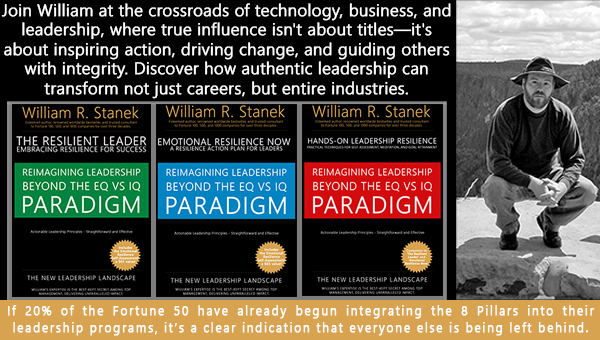
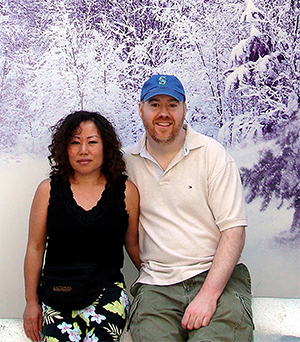
Spotlight on Life's Milestones
In life, certain moments stand out—moments that define who we are and shape the paths we take. These milestones, both personal and professional, offer us the chance to reflect, learn, and grow. In this series, "Spotlight on Life's Milestones," William Stanek invites you to journey with him through the pivotal experiences that have marked his life and the life of his wife, Hui Cha. Through these reflections, you'll discover how to embrace your own milestones with mindfulness and intention, transforming each significant moment into a stepping stone toward living well. Join us as we explore the rich tapestry of life’s milestones, celebrating the journey and the lessons learned along the way.
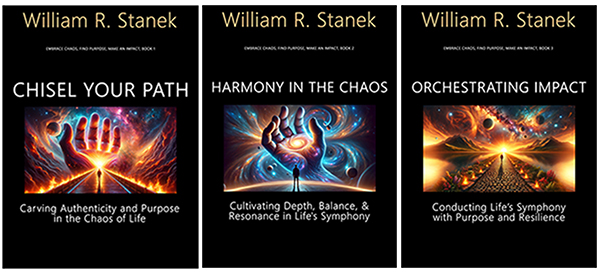
Transform your life with practical wisdom. Discover William Stanek's 'Living Well' series—your guide to a balanced and fulfilling life.
Discover William Stanek's Exclusive Art Collection
Explore and purchase the stunning art featured on this site. Own a piece of William Stanek's unique and captivating artwork today!
(January 15, 2025) Milestones in Emotional Intelligence: Mastering Your Emotions
Emotional intelligence is one of the most important skills we can develop in our journey of personal growth and self-mastery. It involves understanding, managing, and harnessing our emotions in a way that leads to healthier relationships, better decision-making, and a more fulfilling life. Developing emotional intelligence is not just about controlling emotions; it's about becoming deeply aware of them, using them to guide our actions, and creating a sense of harmony within ourselves and with others. In this article, we’ll explore the significance of developing emotional intelligence, how mastering your emotions can impact all areas of life, and how this skill has influenced our interactions and decision-making.
The Importance of Emotional Intelligence: Understanding and Managing Emotions
Emotional intelligence (EI) is the ability to recognize, understand, and manage our own emotions, as well as the emotions of others. It’s a skill that is essential for navigating the complexities of life, from building and maintaining relationships to achieving personal and professional success. Unlike IQ, which measures cognitive abilities, EI is about emotional awareness and regulation—skills that can be developed and refined over time.
For both Hui Cha and me, the journey of developing emotional intelligence has been a transformative one. Early in our lives, like many people, we often found ourselves reacting to situations based on emotion rather than reason. There were moments when frustration, anger, or sadness would take over, leading to decisions and actions that were less than ideal. It wasn’t until we began to consciously develop our emotional intelligence that we started to see a significant shift in how we handled our emotions and, consequently, how we interacted with the world.
One of the key aspects of emotional intelligence is self-awareness—the ability to recognize and understand your own emotions as they arise. This involves being in tune with your emotional responses, understanding what triggers them, and recognizing how they influence your thoughts and behaviors. Self-awareness is the foundation of emotional intelligence because it allows you to pause, reflect, and choose how to respond rather than simply reacting on impulse.
In my own journey, developing self-awareness has been crucial in managing stress and maintaining balance in my life. There were times when the pressures of work, family, and personal responsibilities would build up, leading to feelings of overwhelm and frustration. In the past, these emotions might have led to hasty decisions or strained interactions with others. However, by becoming more aware of my emotional states, I was able to identify these feelings as they arose and take proactive steps to manage them—whether through mindfulness practices, taking a break, or simply talking things out with someone I trust.
Hui Cha also found that developing self-awareness was essential in her creative work. As an artist, emotions play a significant role in the creative process, but they can also be a source of distraction or self-doubt. By becoming more aware of her emotional states, she was able to harness her emotions more effectively, channeling them into her art in a way that was productive and inspiring rather than overwhelming. This self-awareness also allowed her to recognize when she needed to step back, take a break, or seek support, helping her to maintain a healthy balance between creativity and well-being.
Emotional Mastery: The Art of Managing and Harnessing Emotions
While self-awareness is the foundation of emotional intelligence, the next step is emotional mastery—learning how to manage and harness your emotions in a way that serves you and enhances your life. Emotional mastery is not about suppressing or ignoring your emotions; it’s about acknowledging them, understanding their purpose, and using them to guide your actions in a positive direction.
One of the most important aspects of emotional mastery is emotional regulation—the ability to manage your emotional responses in a way that is appropriate to the situation. This means recognizing when emotions are starting to take control and implementing strategies to bring them back into balance. Emotional regulation is especially important in challenging situations, where strong emotions can easily lead to impulsive or harmful decisions.
In our lives, both Hui Cha and I have faced situations where emotional regulation was crucial. One memorable instance was during a particularly stressful period in our lives when we were juggling multiple projects, family responsibilities, and the demands of everyday life. The stress and pressure of these commitments led to heightened emotions, which could have easily resulted in conflict or burnout. However, by practicing emotional regulation, we were able to manage these emotions effectively, ensuring that they did not negatively impact our relationship or our work.
For me, this meant taking the time to step back and assess the situation before reacting. I would ask myself questions like: “What is the real source of my frustration?” or “How can I respond in a way that aligns with my values and goals?” This reflective approach allowed me to respond more calmly and thoughtfully, even in the face of stress. Hui Cha also used emotional regulation techniques, such as deep breathing, mindfulness, and taking time to engage in activities that brought her joy and relaxation. These practices helped her to maintain a sense of balance and perspective, allowing her to navigate challenges with grace and resilience.
Another key aspect of emotional mastery is empathy—the ability to understand and share the feelings of others. Empathy is a powerful tool for building strong relationships, as it allows us to connect with others on a deeper level and respond to their needs with compassion and understanding. Developing empathy has been a cornerstone of our relationship, as it has allowed us to navigate conflicts, support each other through difficult times, and build a strong, loving partnership.
Empathy is not just about understanding others’ emotions; it’s also about being attuned to how our actions and words impact those around us. By practicing empathy, we can become more mindful of our interactions, ensuring that we communicate with kindness, respect, and consideration. This has been particularly important in our relationship, as it has helped us to navigate the inevitable challenges and disagreements that arise in any partnership. By approaching each other with empathy, we’ve been able to resolve conflicts in a way that strengthens our bond and deepens our connection.
The Impact of Emotional Intelligence on Personal and Professional Success
Emotional intelligence is not just a personal skill; it’s a critical factor in achieving success in all areas of life. Whether in personal relationships, professional endeavors, or creative pursuits, emotional intelligence plays a key role in how we navigate challenges, interact with others, and achieve our goals.
In the professional realm, emotional intelligence is increasingly recognized as a key predictor of success. Research has shown that individuals with high emotional intelligence are more likely to excel in leadership roles, build strong teams, and create positive work environments. This is because emotional intelligence allows us to communicate effectively, manage stress, and inspire and motivate others.
For me, developing emotional intelligence has been instrumental in my career, particularly in leadership and collaboration. Early in my career, I often found myself in high-pressure situations where emotions could easily run high. Whether it was leading a team through a challenging project or navigating complex negotiations, the ability to manage my emotions and understand the emotions of others was crucial. By practicing emotional intelligence, I was able to build stronger relationships with colleagues, foster a positive work environment, and achieve better outcomes.
Hui Cha also found that emotional intelligence was key to her success as an artist. In the creative field, where emotions are often at the forefront, being able to understand and manage emotions is essential for maintaining creative flow and overcoming challenges. By developing emotional intelligence, she was able to navigate the ups and downs of the creative process with greater ease, allowing her to produce work that was not only technically skilled but also emotionally resonant.
Emotional intelligence also plays a critical role in personal relationships. Whether with family, friends, or romantic partners, the ability to understand and manage emotions is essential for building and maintaining strong, healthy connections. In our relationship, emotional intelligence has been a guiding force, helping us to navigate the challenges of life together, to communicate openly and honestly, and to support each other’s growth and well-being.
One of the most significant ways that emotional intelligence has impacted our relationship is through the practice of emotional support. This involves being present for each other, offering encouragement and understanding, and being attuned to each other’s emotional needs. By practicing emotional support, we’ve been able to build a relationship that is not only strong and loving but also resilient in the face of challenges.
Developing Emotional Intelligence: Steps to Mastering Your Emotions
Developing emotional intelligence is a lifelong journey, one that involves continuous self-reflection, learning, and growth. By embracing the milestone of emotional intelligence, you can master your emotions, improve your relationships, and achieve greater success in all areas of life.
Here are a few steps you can take to develop emotional intelligence and master your emotions:
-
Cultivate Self-Awareness: Take the time to reflect on your emotions, understanding what triggers them and how they influence your thoughts and behaviors. Practice mindfulness and journaling to become more aware of your emotional states.
-
Practice Emotional Regulation: Learn techniques for managing your emotions, such as deep breathing, mindfulness, and positive self-talk. These strategies can help you maintain emotional balance, even in challenging situations.
-
Develop Empathy: Work on understanding and sharing the feelings of others. Practice active listening, ask open-ended questions, and be mindful of how your words and actions impact those around you.
-
Seek Feedback: Ask for feedback from trusted friends, family, or colleagues on how you handle emotions and interact with others. Use this feedback to identify areas for improvement and to strengthen your emotional intelligence.
-
Reflect on Your Interactions: After challenging interactions, take the time to reflect on how you handled the situation. Consider what you did well and what you could have done differently. Use these reflections to guide your future interactions.
-
Prioritize Self-Care: Emotional intelligence is closely linked to overall well-being. Make sure to prioritize self-care, including physical health, mental health, and stress management, as these are essential for maintaining emotional balance.
The Transformative Power of Emotional Intelligence: Living with Self-Awareness and Mastery
Developing emotional intelligence is a transformative milestone that can lead to greater self-awareness, better relationships, and more success in all areas of life. By mastering your emotions, you can navigate the complexities of life with greater ease, respond to challenges with resilience, and build stronger connections with others.
For Hui Cha and me, the journey of developing emotional intelligence has been one of the most rewarding aspects of our lives. It has allowed us to understand and manage our emotions, to build a strong and loving relationship, and to achieve our personal and professional goals. As we continue on our journey of living well, we remain committed to developing our emotional intelligence, knowing that it is a key to living a balanced, fulfilling, and meaningful life.
A Call to Action: Embrace the Milestone of Emotional Intelligence
Emotional intelligence is a powerful tool for self-awareness, emotional mastery, and personal success. By embracing this milestone, you can develop the skills needed to understand, manage, and harness your emotions, leading to a more fulfilling and successful life.
Here are a few steps you can take to embrace the milestone of emotional intelligence:
-
Develop Self-Awareness: Reflect on your emotions and how they influence your thoughts and behaviors. Practice mindfulness to become more aware of your emotional states.
-
Practice Emotional Regulation: Learn techniques for managing your emotions, such as deep breathing and mindfulness. These strategies can help you maintain emotional balance.
-
Cultivate Empathy: Work on understanding and sharing the feelings of others. Practice active listening and be mindful of how your actions impact those around you.
-
Seek Feedback and Reflect: Ask for feedback on how you handle emotions and use this feedback to improve your emotional intelligence. Reflect on your interactions and learn from your experiences.
-
Prioritize Self-Care: Emotional intelligence is linked to overall well-being. Make self-care a priority to maintain emotional balance and resilience.
Emotional intelligence is a key to mastering your emotions, improving your relationships, and achieving success. By embracing this milestone, you can live a life that is balanced, fulfilling, and deeply connected to others.
Embrace the milestone of emotional intelligence, master your emotions, and continue on your journey of living well.
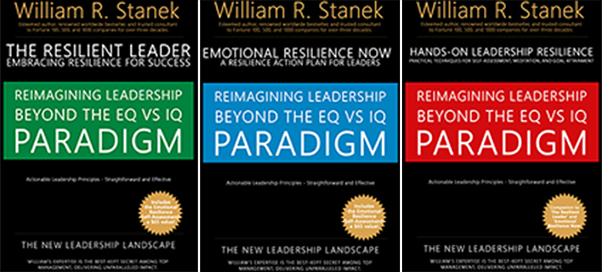
Join William at the crossroads of technology, business, and leadership, where true influence isn't about titles - it's about inspiring action, driving change, and guiding others with integrity. Discover how authentic leadership can transform not just careers, but entire industries.
Bring Inspiration Home
Enhance your space with William Stanek's evocative art. Each piece is crafted to inspire and uplift your everyday life.
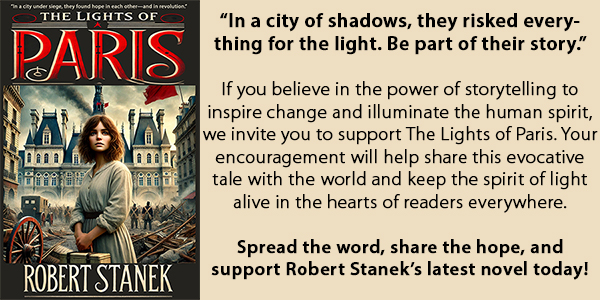
Support The Lights of Paris by Robert Stanek, William Stanek's pen name! Through vivid historical detail and deeply moving character stories, Robert takes readers on an unforgettable journey through one of history’s most transformative times.
